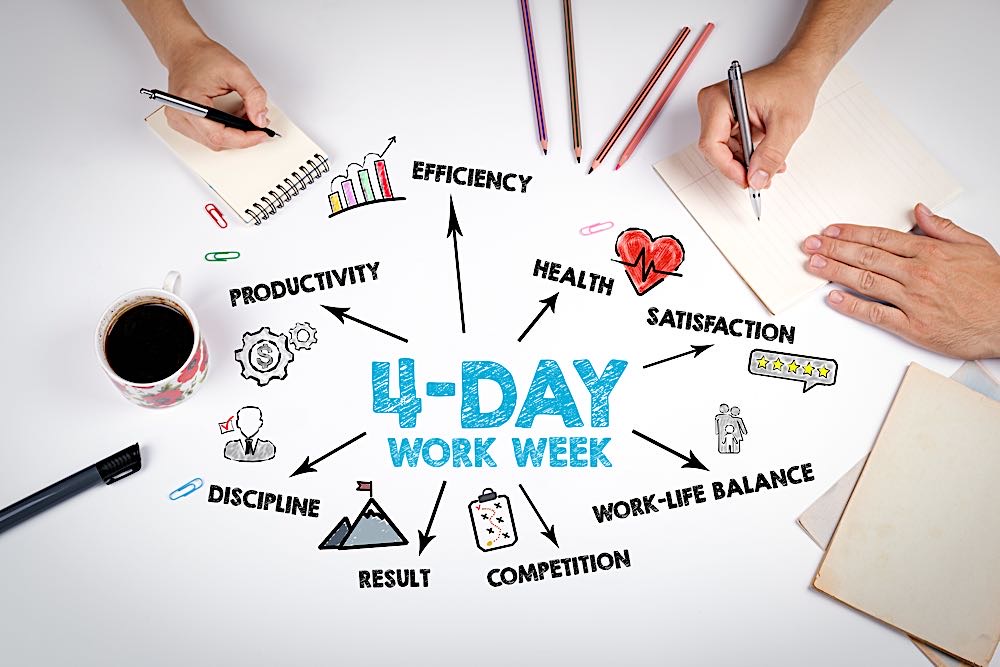
100% of Employers That Participated in Four-Day Workweek Project Say They’re Making it Permanent
All employers that participated in a six-month, four-day workweek experiment have concluded that the approach was so successful on every level, that they are making it permanent.
The pilot project, which was coordinated by the UK-based non-profit organization 4 Day Week Global, involved 33 companies and nearly 1,000 employees in several countries including Canada, the U.S., Ireland, and Australia.
Not only did employees report being “extremely satisfied” with the shorter workweek —with a whopping 97% saying that they want it to be a permanent feature — but employers (who gave staff an extra day off without a reduction in pay) also experienced reduced absenteeism, lower turnover, and greater profitability. Specifically, revenues in participating organizations increased an average of 8% during the half-year project.
“We were encouraged that participants did not experience an increase in the intensity of work,” commented lead researcher and Boston College professor Juliet Schor. “This suggests that the work re-organization strategy succeeded and performance was not achieved via speedup, which is neither sustainable nor desirable.”
Despite these gains, HR experts urge employers — and enthusiastic employees — not to see a four-day workweek as a magic wand that will instantly and automatically improve everything from engagement to profitability. In a co-written article published by Harvard Business Review, Harvard Business School professor Ashley Whillans and CEO of the 4 Day Week Global campaign Charlotte Lockhart, recommend the following key steps to transition to a successful, sustainable, and successful 4-day workweek reality:
-
Step 1: Shift the focus to results vs. process.
Advises Whillans and Lockhart: “For a four-day workweek to be successful, leaders must shift their mindsets to value actual productivity, not just hours worked. They must ensure that employees aren’t worried they will be penalized for prioritizing work-life balance, and that starts with modeling a healthier work-life balance themselves.”
-
Step 2: Define goals and metrics.
Whillans and Lockhart say that leaders need to ask questions like: How will the organization measure productivity? What support will employees need to make this pilot a success? How long should the organization run this pilot? Are there any legal concerns we should be aware of? At the same time, employees need to ask questions like: Should we work four eight-hour days, or reduced hours on five days? Which days or hours should we take off? How can we keep the change from negatively impacting our clients, customers, and other stakeholders? What steps can we take to increase our productivity? How will we share our ideas for process improvements with one another?
-
Step 3: Communicate internally and externally.
Advises Whillans and Lockhart: “Every organization is different, so encourage conversations about how to get more done in less time — whether that’s by implementing new tools, eliminating unnecessary meetings, or making existing meetings more effective. The same is true externally. Many companies worry what their clients will think if they reduce hours, but those worries can often be assuaged with a simple conversation. Identify which customers, partners, or other stakeholders might be affected, and work with the appropriate internal representatives to ensure the scheduling change is communicated clearly”.
-
Step 4: Run a pilot
Some key questions that Whillans and Lockhart have seen come out of pilot programs include: What are the boundaries I need to put in place for myself and my team? What assistance do I need from leadership to accomplish a reduced work schedule? What will happen to team activities like “cake Fridays”?
While the journey to a beneficial and rewarding four-day workweek varies from organization to organization (and also possibly from team to team), employers that have successfully navigated their way through to the other side only seem to have one regret: that they didn’t embark sooner.
“The four-day week has been transformative for our business and our people,” commented Jon Leland, Chief Strategy Officer at Kickstarter, which participated in the 4 Day Week Global pilot project. “Staff are more focused, more engaged and more dedicated, helping us hit our goals better than before. Greater employee retention and faster hiring has been surprisingly powerful in driving improved business outcomes too. We’re achieving more as an organization, while giving people time to start new creative projects, rest, and be with their families. It’s a true win-win.”
Contact HR


 Our HR solutions experts can recommend the right mix of HR outsourced services to make your entry into Canada easier.
Our HR solutions experts can recommend the right mix of HR outsourced services to make your entry into Canada easier.  Pivotal Employment Management Services co-hires your workforce, simplifying entry of your business in Canada.
Pivotal Employment Management Services co-hires your workforce, simplifying entry of your business in Canada. 















